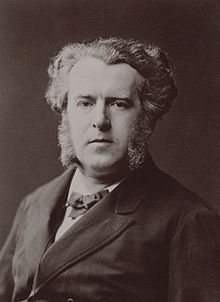Charles Thomas Floquet
Charles Thomas Floquet (born October 2, 1828 in Saint-Jean-Pied-de-Port , † January 18, 1896 in Paris ) was a French lawyer, politician and Prime Minister .
Life
Charles Thomas Floquet studied law and then worked as a lawyer in Paris from 1851. The coup of Napoleon III. on December 2, 1851, Floquet met with fierce resistance; he had already made known his republican sentiments as a student when he took part in the fighting of the February Revolution of 1848 . As a result, he was one of the fiercest opponents of the Second Empire , pleaded in numerous political trials in which he violently attacked the government, and took part in the editing of radical newspapers. In 1864 he organized a democratic electoral committee with twelve other members of the opposition, including Louis-Antoine Garnier-Pagès , Hippolyte Carnot , Ferdinand Hérold , Amaury Dréo and Jules Ferry , and was therefore involved in the so-called Process of the Thirteen. He made himself even better known when in 1867, when the Russian Emperor Alexander II visited the Palace of Justice during a stay in Paris on the occasion of the world exhibition , he said "Vive lag Pologne, Monsieur!" ("Long live Poland, Monsieur!" ) called out. In the trial of Prince Pierre Napoleon Bonaparte for the murder of Victor Noir (March 1870), Floquet pleaded for the dead man's family with great success.
After the fall of the Empire and the proclamation of the Third French Republic Floquet was on September 5, 1870. adjuncts of the mayor of Paris, Etienne Arago , appointed, but favored the communist aspirations and therefore had after the revolt of October 31, 1870 to resign . On February 8, 1871, he was elected to the National Assembly of the Seine department . After the end of the Franco-Prussian War he voted against the peace preliminaries and tried to mediate a peace between the revolters and the government meeting in Versailles during the uprising of the Paris Commune . In the meantime he was accused of being in secret agreement with the Paris Commune. After he had resigned from his parliamentary mandate in April, he was arrested on the orders of Adolphe Thiers in Biarritz and held in the castle of Pau in June 1871 , but released after 30 days. He then became editor of the République Française .
The 11th arrondissement elected Floquet on April 28, 1872 and again in 1874 in the Paris municipal council. On February 20, 1876, the same arrondissement sent him to the Chamber of Deputies , to which he has always been a member. Here he joined the extreme left, became president of the Union républicaine faction and, as an excellent speaker, soon gained great influence. He requested the lifting of the state of siege on 42 departments and a full amnesty for the communists. Other radical proposals came from him in the period that followed. In January 1882 he was appointed prefect of the Seine department, but resigned from office in October 1882. When the President of the Chamber of Deputies, Henri Brisson , took over the presidency on April 6, 1885, Floquet was elected as the new chamber president two days later. He exercised this difficult position with such tact and impartiality that he was re-elected in the following two years.
After Floquet had atoned for his hasty word of 1867 through accommodating behavior towards the Russian ambassador and thus proved himself fit as a minister, after the overthrow of Pierre Tirard (April 3, 1888) he was entrusted with the formation of a new cabinet, in which he was Prime Minister and Minister of the Interior was. The cabinet included a moderate revision of the constitution in its program, but reserved the right to determine when. At the time, Floquet was in opposition to Georges Boulanger and his “Boulangism movement”, and heated debates broke out. On July 12, 1888, a duel between the two opponents even took place in Neuilly, in which Floquet Boulanger seriously wounded. Boulanger's increased popularity led Floquet to submit his draft constitutional amendment to the Chamber in October 1888. However, as the latter, realizing the dangerousness of the experiment, accepted an application to adjourn on February 14, 1889, Floquet resigned.
When the newly elected Chamber of Deputies met in November 1889, they re-elected Floquet as their President and renewed this election in the following years. 1892 Floquet was so far in the Panama scandals involved with when he had to admit to have "monitored" the distribution of funds of the Panama Company to the newspapers in his capacity as Prime Minister 1889th As a result, his political influence waned and he lost his post as President of the Chamber of Deputies on January 10, 1893 and also his mandate in the elections of August / September 1893, but was elected to the Senate for life on January 7, 1894 . He died in Paris on January 18, 1896 at the age of 67. His personal papers are kept in the French National Archives.
literature
- Floquet, Charles Thomas , in: Brockhaus' Konversations-Lexikon , 14th edition, 1892–96, Vol. 6, pp. 909 f.
- Floquet, Charles Thomas , in: Encyclopædia Britannica , 11th Edition, 1910-11, Vol. 10, p. 527.
Web links
- Charles Thomas Floquet on the National Assembly website
- Charles Thomas Floquet on the Senate website
| personal data | |
|---|---|
| SURNAME | Floquet, Charles Thomas |
| BRIEF DESCRIPTION | French politician and prime minister |
| DATE OF BIRTH | October 2, 1828 |
| PLACE OF BIRTH | Saint-Jean-Pied-de-Port |
| DATE OF DEATH | January 18, 1896 |
| Place of death | Paris |
